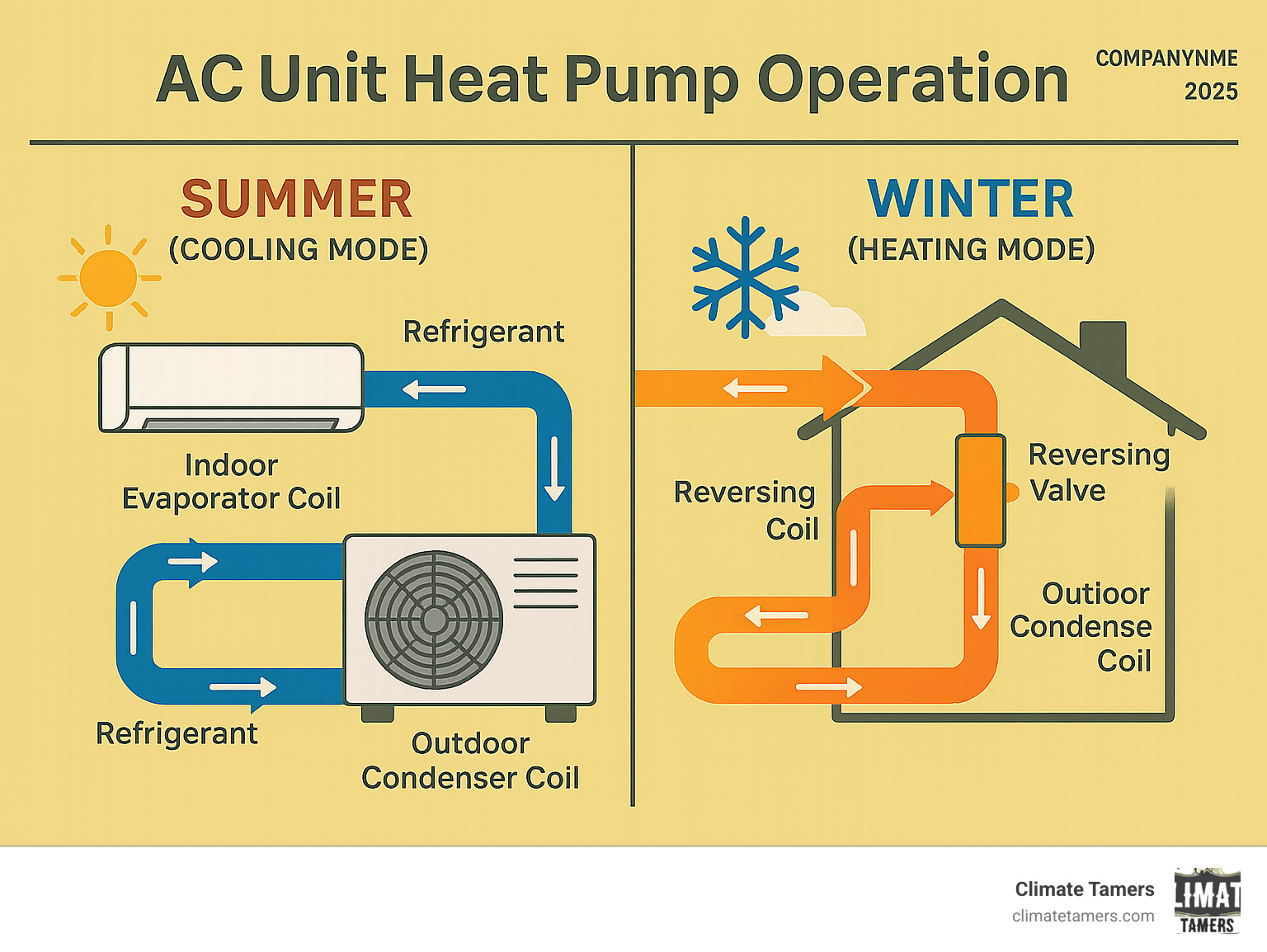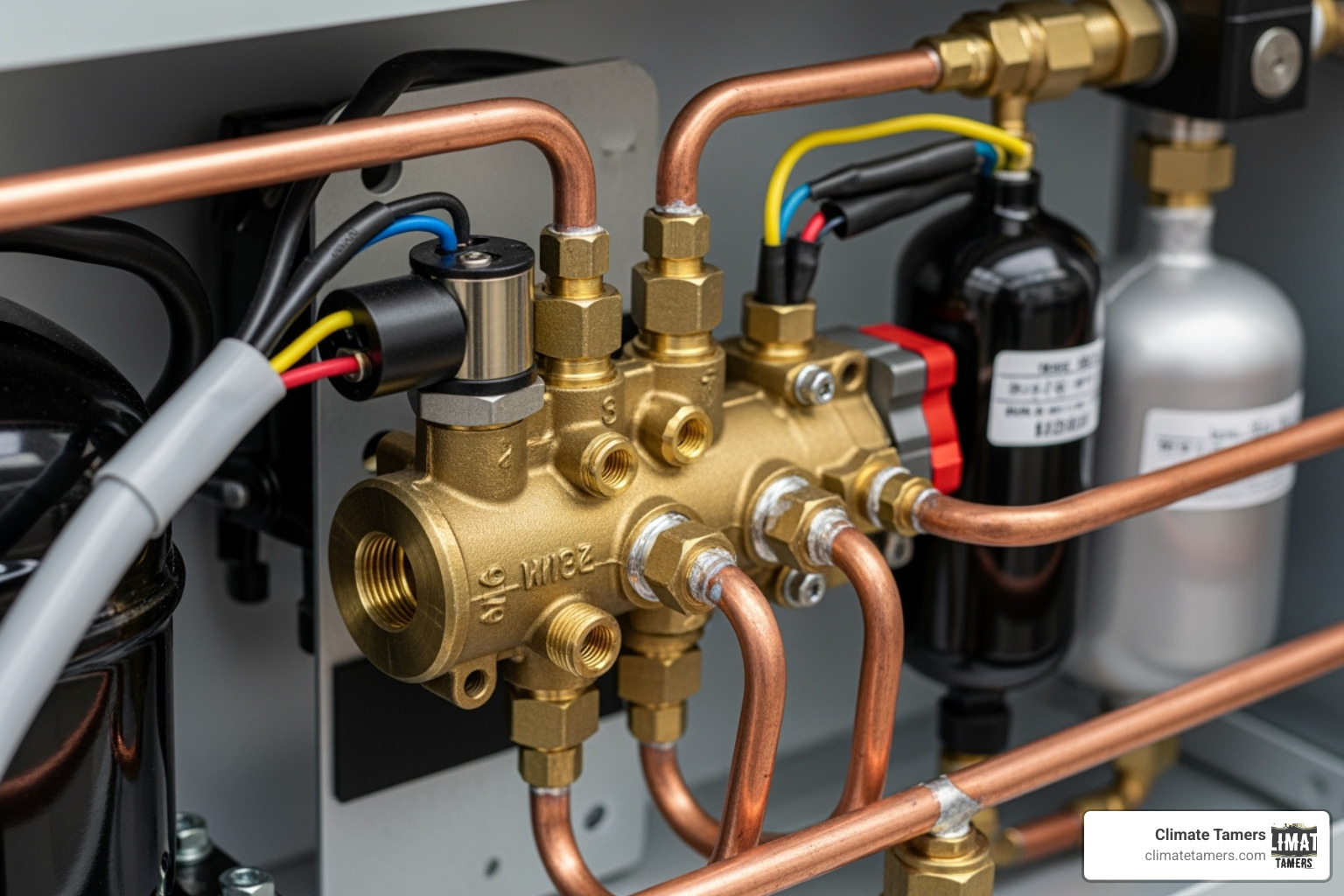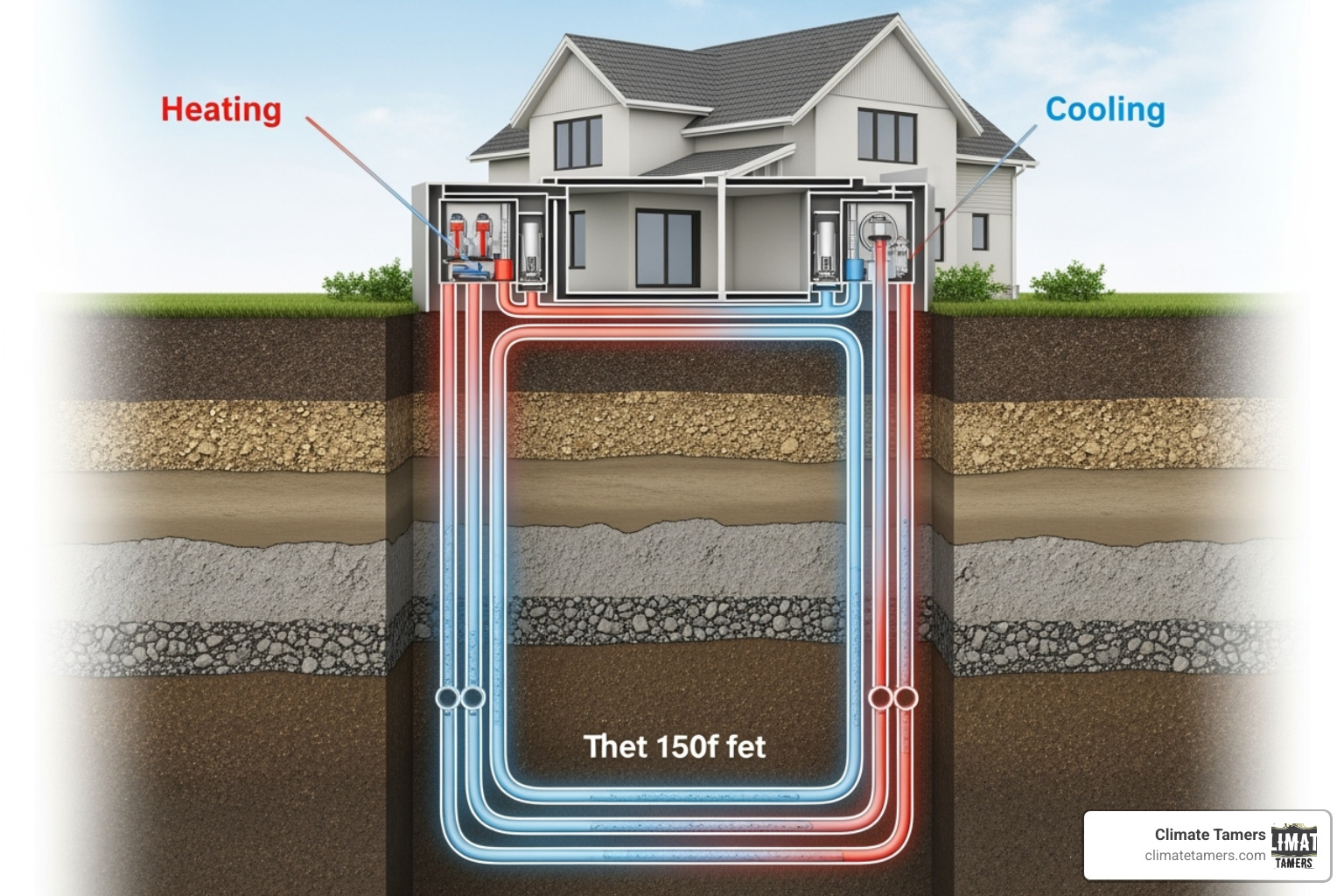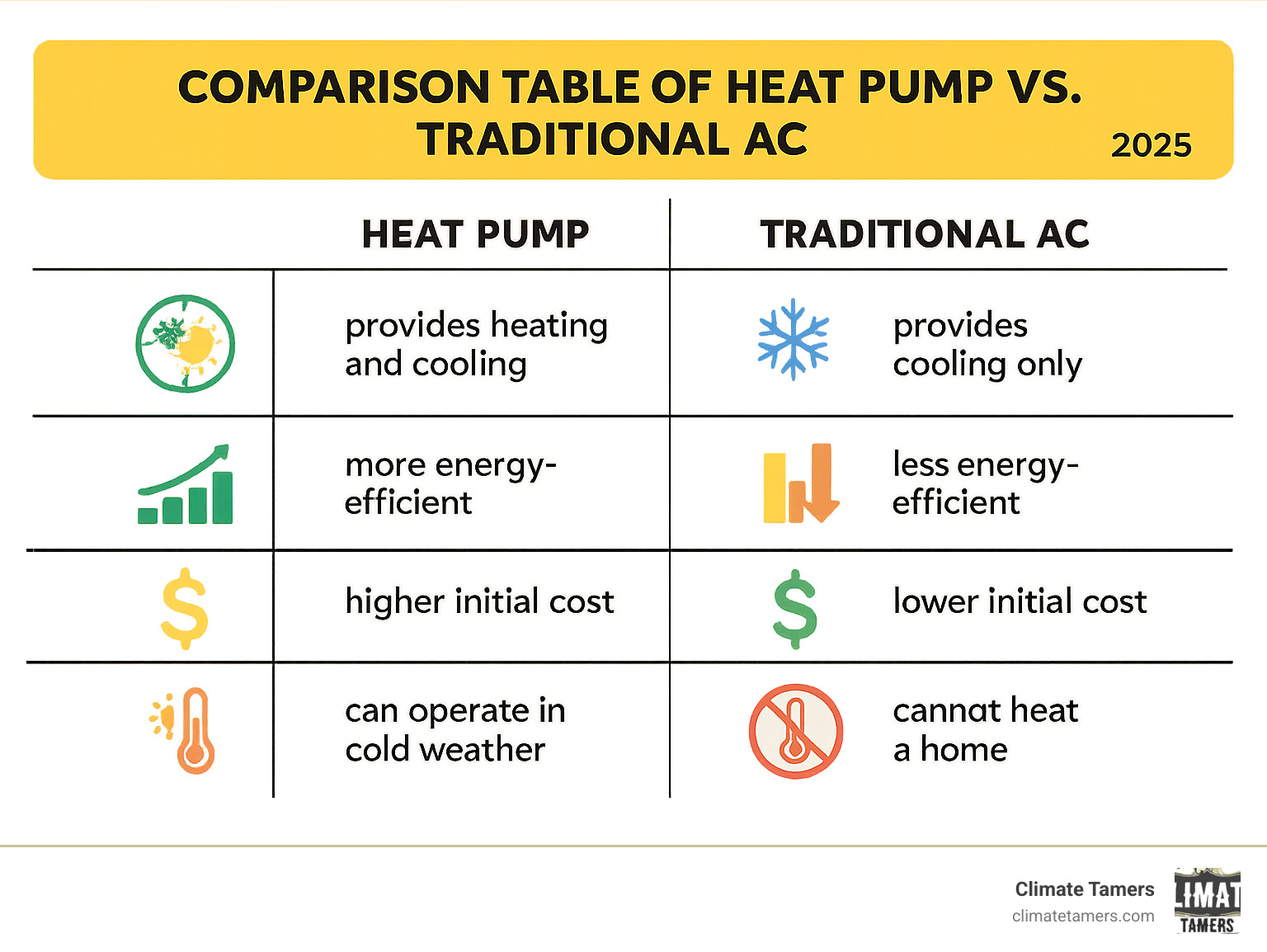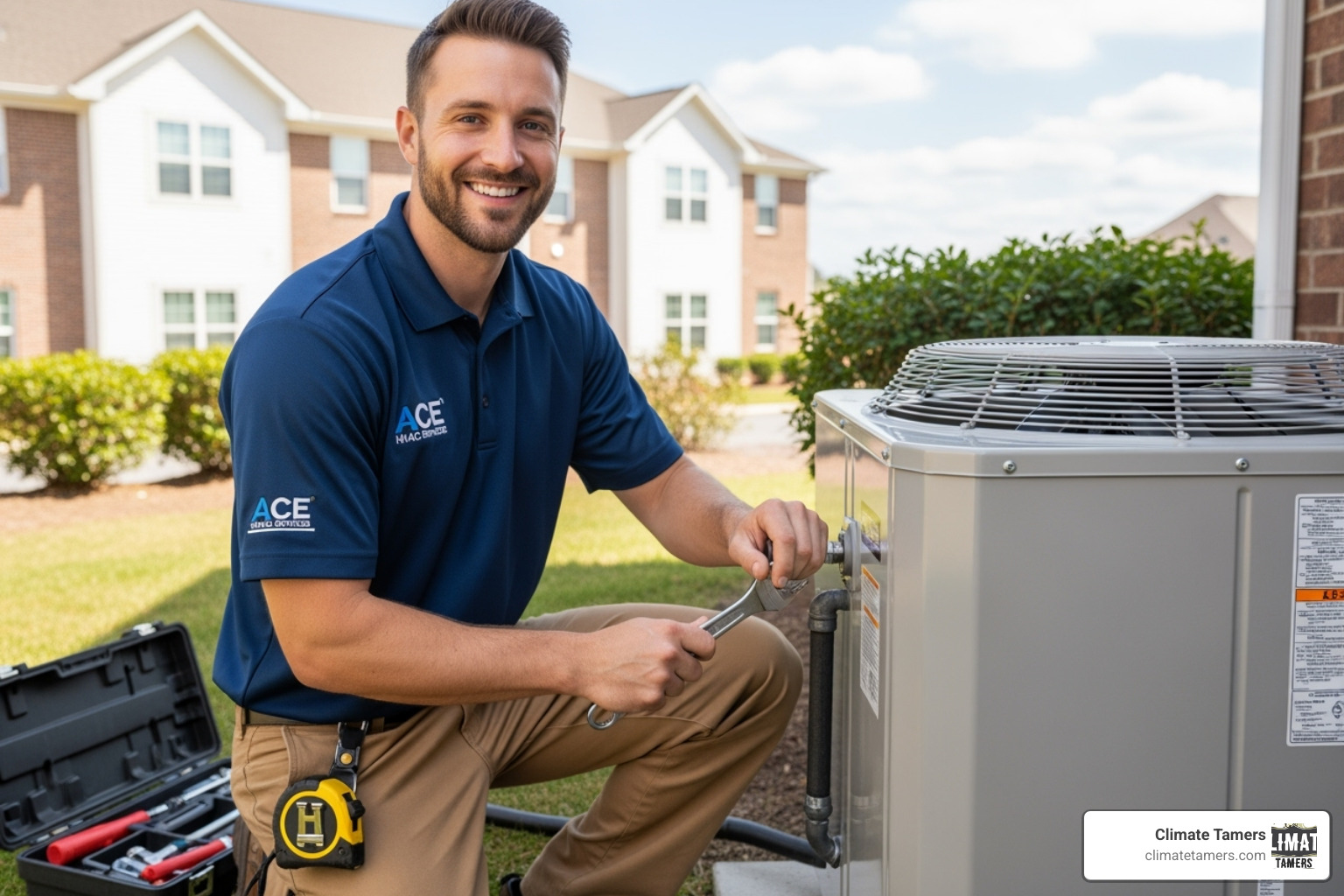Why AC Unit Heat Pumps Are Revolutionizing Home Comfort
An AC unit heat pump is a single system that provides both heating and cooling for your home by transferring heat rather than creating it. Unlike traditional air conditioners that only cool, heat pumps can reverse their operation to heat your home in winter and cool it in summer.
Key Benefits of AC Unit Heat Pumps:
- All-in-one solution – replaces both furnace and air conditioner
- Energy efficient – uses 2-5 times less energy than traditional heating
- Year-round comfort – heating and cooling in one system
- Lower emissions – produces 45-70% fewer emissions than gas furnaces
- Better dehumidification – superior moisture control compared to standard ACs
Heat pumps work by moving heat from one place to another using a refrigerant cycle. In summer, they pull heat from inside your home and release it outside (just like a regular AC). In winter, they extract heat from the outdoor air – even when it’s cold – and pump it inside to warm your home.
Modern heat pumps can operate effectively in temperatures as low as -15°F to -22°F, making them suitable for virtually all U.S. climates. They’re particularly ideal for areas like New Orleans, where mild winters allow heat pumps to operate at peak efficiency year-round.
The main difference between a heat pump and a regular air conditioner is a component called a reversing valve. This valve allows the heat pump to change the direction of refrigerant flow, switching between heating and cooling modes as needed.
What is an AC Unit Heat Pump and How Does It Work?
Think of an AC unit heat pump as nature’s ultimate recycling system. Instead of burning fuel to create heat from scratch, it cleverly moves heat that already exists from one place to another. It’s like having a magical heat elevator that can pick up warmth wherever it finds it and deliver it exactly where you need it.
The heart of this system is something called a reversing valve – and it’s every bit as clever as it sounds. This little component is what transforms an ordinary air conditioner into a year-round comfort machine. When you want cooling, it sends the refrigerant one way. When you need heat, it flips the script and sends everything in reverse.
Here’s how the refrigerant cycle works its magic. A special fluid circulates continuously through a closed loop of coils and components. As this refrigerant flows, it’s constantly changing between liquid and gas states, absorbing and releasing heat along the way. It’s the same principle your refrigerator uses, just scaled up and made reversible.
During cooling mode operation, your heat pump acts just like a traditional air conditioner. The indoor coil becomes an evaporator, soaking up heat from your home’s air like a sponge. That heated refrigerant then travels outside, where the outdoor coil acts as a condenser, releasing all that unwanted heat into the great outdoors. The result? Cool, comfortable air flowing back into your living space.
But here’s where things get really interesting. In heating mode operation, that reversing valve flips everything around. Now the outdoor coil becomes the evaporator, actually pulling heat from the outside air – even when it’s chilly out there. Yes, even cold air contains heat energy! This warmed refrigerant then heads indoors, where the indoor coil becomes the condenser, releasing that captured heat throughout your home.
This heat transfer versus heat creation approach is what makes heat pumps so incredibly efficient. Instead of burning gas or using electric resistance coils to generate heat, they’re simply moving existing heat around. It’s like the difference between manufacturing something from scratch versus finding what you need and relocating it.
The Two Main Types of Heat Pumps
When you’re shopping for an AC unit heat pump, you’ll encounter two main varieties, each with its own personality and strengths.
Air-source heat pumps are the popular kids on the block – and for good reason. These systems work by exchanging heat between your indoor air and the outdoor air. They’re relatively straightforward to install, making them a great choice for most homes. Modern air-source models have gotten remarkably good at handling cold weather, so they’re no longer the fair-weather friends they used to be.
Ground-source or geothermal heat pumps are the overachievers of the heat pump world. These systems tap into the earth’s steady underground temperatures, which stay remarkably consistent year-round. While the initial installation requires some digging to install the underground loop system, these units can be incredibly efficient – sometimes using up to 61% less energy than standard models. Think of it as having a direct line to nature’s own climate control system.
There’s also a third option worth mentioning: ductless mini-split systems. These are essentially air-source heat pumps that don’t need your home’s existing ductwork. They consist of an outdoor unit connected to one or more indoor units mounted on walls or ceilings. They’re perfect for homes without ducts, new additions, or when you want precise control over different areas of your home. If you’re curious about how these systems can give you better control over your comfort while potentially saving energy, you might want to learn more about the Benefits Ductless Heating Cooling System.
Weighing the Pros and Cons of Heat Pump Systems
Choosing an AC unit heat pump for your home is like weighing the pros and cons of any major life decision. You want to make sure you’re getting the best value for your investment while truly understanding what you’re signing up for. Let’s break down the real advantages and honest challenges so you can make an informed choice.
Advantages of an AC Unit Heat Pump
The benefits of an AC unit heat pump are pretty impressive, especially when you start adding them up over time.
Single-unit convenience is probably the first thing you’ll notice. Instead of juggling two separate systems – one for heating and another for cooling – you get one smart system that handles everything. No more coordinating maintenance schedules for multiple units or finding space for both a furnace and an AC. It’s like having a Swiss Army knife for your home comfort needs.
The superior energy efficiency is where things get really exciting for your wallet. Heat pumps don’t create heat from scratch like traditional furnaces do. Instead, they’re like heat movers, transferring warmth from one place to another. This approach uses two to five times less energy than conventional heating methods. For heating specifically, you could see up to 75% less electricity use compared to electric resistance heating. That efficiency translates directly into lower monthly bills. When you’re ready to explore options, high-efficiency heat pumps can maximize these savings even further.
Lower carbon emissions make heat pumps a win for the environment too. Gas furnaces produce 45 to 70 percent more emissions than heat pumps. So when you choose electric-powered heating and cooling, you’re making a meaningful difference for the planet while keeping your home comfortable.
Here’s something many homeowners don’t expect: improved dehumidification. High-efficiency heat pumps actually remove moisture from your home better than standard air conditioners. In a humid place like New Orleans, this is huge. Better humidity control means you feel more comfortable at higher temperatures, and it can even improve indoor air quality heat pump systems provide by reducing conditions that promote mold and mildew growth.
Potential Challenges and Climate Considerations
Now for the honest talk about potential challenges. Every system has trade-offs, and heat pumps are no exception.
The upfront installation cost tends to be higher than a traditional air conditioner alone. But here’s the thing – you’re not just replacing your AC. You’re replacing both your heating and cooling systems. When you look at it that way, the cost often evens out compared to buying a new AC plus a new furnace. Factor in available incentives, and heat pumps can actually cost less than separate systems.
Performance in extreme cold used to be a real concern with older heat pump models. The good news? Modern technology has largely solved this problem. Today’s cold-climate heat pumps keep your home warm and comfortable even when temperatures drop well below freezing. Some models work efficiently down to -22°F. They might kick in some supplemental electric heating during the coldest days, but their main heating power is remarkably robust. Modern advancements for cold climates have made heat pumps viable across the entire United States.
Year-round wear and tear is something to consider since your AC unit heat pump works throughout the year instead of taking seasonal breaks. This means more operating hours compared to systems that only run part of the time. However, modern heat pumps are built for this continuous duty, and proper maintenance keeps them running smoothly for their expected lifespan. If you want to dive deeper into managing these considerations, our guide on understanding heat pump challenges: essential information for homeowners covers everything you need to know.
The bottom line? For most homes, especially in moderate climates like ours in New Orleans, the advantages far outweigh the challenges. Heat pumps offer an neat solution that combines efficiency, convenience, and environmental responsibility into one reliable system.
Cost, Longevity, and Making the Switch
Making the leap to an AC unit heat pump is about more than just comfort—it’s a smart financial decision that pays dividends for years to come. Let’s break down what you can expect in terms of investment, longevity, and long-term value.
Your heat pump will be working hard for you year-round, which means it needs a little extra love to keep performing at its best. Since it’s handling both heating and cooling duties, it naturally accumulates more running time than a system that only operates seasonally. The good news? The total maintenance required is actually comparable to what you’d spend servicing both a separate furnace and air conditioner. Regular professional tune-ups are your best friend here—they’ll keep your system humming efficiently and help it reach its full lifespan potential. Our Maintenance Tips Home Heat Pump guide offers practical advice to help you get the most from your investment.
You can expect your AC unit heat pump to serve your family faithfully for around 15 years—right in line with traditional heating and cooling systems. Of course, this depends on how much you use it, your local climate, and how well you maintain it. If your current AC is getting long in the tooth or you’re facing a hefty repair bill, it might be the perfect time to consider upgrading. Our comprehensive guide Should You Repair or Replace Your Heat Pump? can help you steer that decision with confidence.
Cost Comparison: AC Unit Heat Pump vs. Traditional AC
When evaluating costs, it’s important to look at the complete picture rather than just the initial price tag.
The installation cost for an AC unit heat pump might seem higher than a cooling-only AC at first glance, but remember—you’re replacing two systems with one. When you factor in available incentives and rebates, many homeowners find their heat pump actually costs the same or even less than a traditional AC unit. It’s like getting your heating system as a bonus!
The real magic happens with long-term energy savings. Because heat pumps move heat rather than create it, they’re incredibly efficient. This translates directly into lower utility bills month after month. If you’re currently heating with an older, less efficient system, the savings can be particularly dramatic.
Your operating costs will depend on local electricity rates, but the superior efficiency of heat pumps typically means lower overall energy consumption for both heating and cooling. Many of our customers are pleasantly surprised by their first energy bill after installation.
The return on investment often happens faster than you might expect. While there may be a slightly higher upfront cost, the combination of energy savings and government incentives frequently leads to quicker payback compared to traditional systems. You’re not just buying equipment—you’re investing in years of comfortable, efficient home climate control.
Government Incentives and Rebates
Right now is an exceptional time to make the switch to an AC unit heat pump, thanks to generous government incentives designed to make energy-efficient systems more accessible to homeowners.
The Energy Efficient Home Improvement Tax Credit offers up to $2,000 per year back on your taxes for qualifying heat pumps. It’s essentially the government’s way of saying “thank you” for choosing efficiency.
The HOMES Rebate Program puts cash back in your pocket as you save energy with your new heat pump. This program rewards you for making smart energy choices that benefit both your wallet and the environment.
For families with low to moderate incomes, the HEEHRA program offers substantial point-of-sale discounts of up to $8,000 for qualifying heat pump installations. This makes high-efficiency heating and cooling accessible to more households than ever before. You can explore the complete HEEHRA program details to see if your family qualifies.
Don’t forget to check for state and local programs in your area. Many Louisiana communities and energy providers offer additional incentives, rebates, or special financing options that can further reduce your investment. These programs change regularly, so it’s worth investigating what’s available in the Greater New Orleans area right now.
All these incentives can significantly reduce the net cost of your heat pump installation, making it an even smarter choice for your family’s comfort and budget.
Frequently Asked Questions about Heat Pumps
When homeowners in New Orleans start exploring AC unit heat pump options, we hear the same thoughtful questions over and over. Let’s tackle the big ones that might be on your mind too.
Can a heat pump completely replace my furnace and my air conditioner?
Absolutely! In climates like ours here in New Orleans, an AC unit heat pump is truly the ultimate all-in-one solution. Think of it as getting two appliances rolled into one efficient package – it’ll keep you cool during our sweltering summers and cozy during those surprisingly chilly winter nights.
Our mild Louisiana winters are actually perfect for heat pumps. They can handle our typical winter temperatures with ease, providing both comfortable and efficient heating without breaking a sweat. You won’t miss having separate systems at all.
Now, if you lived somewhere with brutal winters and weeks of sub-zero temperatures, you might consider a dual-fuel system – that’s a heat pump paired with a gas furnace backup for those extra-cold snaps. But honestly, modern heat pumps have become so capable that even homeowners in colder climates are finding they can rely on their heat pump alone most of the time.
Do heat pumps work efficiently when it’s very cold outside?
This question usually comes from folks who remember the old days of heat pump technology, and we totally understand the concern! Older heat pumps did struggle when temperatures dropped below 25°F, which gave the whole technology a bit of a reputation.
But here’s the exciting news – modern cold-climate heat pumps are game-changers. Today’s models operate efficiently in temperatures as low as -15°F to -22°F. That’s seriously impressive engineering! These systems are designed to extract heat from outdoor air even when it feels absolutely frigid to us humans.
The key difference is efficiency. Compared to old-fashioned electric resistance heating (like baseboard heaters), heat pumps deliver several times more heat per unit of electricity. Even on cold days, they’re working smarter, not harder. During extreme cold snaps, your heat pump might call on a bit of supplemental heat, but its primary heating power remains strong and efficient.
Do heat pumps require more maintenance than a standard AC?
This is such a practical question, and we appreciate homeowners thinking ahead about upkeep! Since your AC unit heat pump works year-round – cooling in summer, heating in winter – it does rack up more operating hours than a seasonal AC unit that gets to rest half the year.
This means your heat pump will need consistent attention throughout the year. You’ll want to stay on top of regular filter changes and schedule professional tune-ups for both heating and cooling seasons. But here’s the thing – the total maintenance is really comparable to what you’d need for a separate air conditioner and a furnace combined.
You’re essentially getting two systems in one, so maintaining that single system properly ensures you get the longevity and peak performance you’re paying for. We always recommend scheduling professional maintenance twice a year – once in spring to get ready for cooling season, and once in fall to prep for heating season. This keeps your investment running smoothly and efficiently for years to come.
The bottom line? A little extra attention goes a long way in keeping your heat pump happy and your energy bills low.
Is a Heat Pump the Right Choice for Your New Orleans Home?
If you’re living in the Greater New Orleans area, you’ve probably experienced our unique climate – those steamy summers that seem to stretch on forever and winters that can surprise you with their chill. An AC unit heat pump is practically tailor-made for our Louisiana weather patterns.
Our mild winters are where heat pumps truly shine. Unlike northern climates where temperatures plummet well below freezing for months, New Orleans rarely sees extreme cold. This means your heat pump will operate at peak efficiency throughout our heating season, providing cozy warmth without the sky-high energy bills that come with traditional electric or gas heating systems.
When summer arrives with its signature heat and humidity, your heat pump transforms seamlessly into a powerful cooling system. It doesn’t just cool your home – it also provides superior dehumidification compared to standard air conditioners. Anyone who’s lived here knows that controlling humidity is just as important as controlling temperature for true comfort.
The beauty of choosing an AC unit heat pump for your New Orleans home lies in its all-in-one convenience. You’re getting a complete climate control solution that handles every season our area throws at it. No more juggling separate heating and cooling systems or worrying about which one needs maintenance when.
The long-term energy savings are particularly attractive for Louisiana homeowners. With our extended cooling seasons and the efficiency gains during our mild heating periods, you’ll likely see a noticeable difference in your utility bills. Plus, by choosing an electric heat pump over gas heating, you’re making an environmentally friendly choice that reduces your home’s carbon footprint – something that’s becoming increasingly important to families across our region.
At Climate Tamers, we understand the specific challenges of keeping homes comfortable in our Greater New Orleans climate. Whether you’re in the heart of New Orleans, out in Metairie, or over in Kenner, we’ve seen how different neighborhoods and home styles respond to our weather patterns. We’re prompt, reliable, and committed to earning your trust through exceptional service that lasts long after installation.
For expert advice on selecting and installing the perfect system for your home, explore our Heat Pump Services in New Orleans, LA. We’re here to help you tame your climate and ensure your home stays comfortable, efficient, and healthy all year long – because that’s what Louisiana living should feel like.




